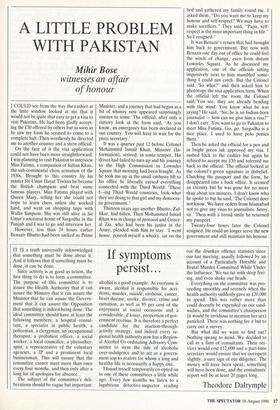A LITTLE PROBLEM WITH PAKISTAN
Mihir Bose witnesses an affair of honour
I COULD see from the way the cashier at the little window looked at me that it would not be quite that easy to get a visa to visit Pakistan. He had been gladly accept- ing the £30 offered by others but as soon as he saw my form he seemed to come to a complete halt. Then wordlessly he directed me to another counter and a stern official.
On the face of it the visa application could not have been more straightforward. I was planning to visit Pakistan to interview Miss Fatima, a companion of Sultan Khan, the sub-continental chess sensation of the 1930s. Brought to this country by his master Sir Umar Hayat Tiwana he became the British champion and beat some famous players. Miss Fatima played with Queen Mary, telling her she could not hope to learn chess unless she worked hard, and went on shopping trips with Wallis Simpson. She was still alive in Sir Umar's ancestral home of Sargodha in the Punjab and I was to go and interview her.
However, less than 24 hours earlier Benazir Bhutto had been sacked as Prime Minister, and a journey that had begun as a bit of whimsy now appeared surprisingly sinister to some. The official, after only a cursory look at the form said, 'As you know, an emergency has been declared in our country. You will have to wait for the press secretary.'
It was a quarter past 12 before Colonel Mohammed Ismail Khan, Minister (In- formation), arrived, in some temper. His driver had failed to turn up and his journey to the High Commission in Lowndes Square that morning had been fraught. As he took me up in the small embassy lift to his office he liberally cursed everything connected with the Third World. 'These f---ing Third World countries, look what they are doing to that girl and my democra- tic government .'
Thirteen years ago another Bhutto, Zul- fikar, had fallen. Then Mohammed Ismail Khan was in charge of protocol and Gener- al Zia, who had been his junior in the Army, pleaded with him to stay. 'I went home, poured myself a whisky, sat on the bed and gathered my family round me. I asked them, "Do you want me to keep my honour and self-respect? We may have to make sacrifices." They said, "Papa, self- respect is the most important thing in life." So I resigned.'
It was Benazir's return that had brought him back to government. But now with Benazir one day out of office he could feel the winds of change, even from distant Lowndes Square. As he discussed my application, one of the officials sitting impassively next to him mumbled some- thing I could not catch. But the Colonel said, 'So what?' and then asked him to photocopy the visa application form. When the official left the room the Colonel said,'You see, they are already bending with the wind. You know what he was saying? He said, "Sir, he is an Indian-born journalist — how can we give him a visa?" I don't care. You want to go to Pakistan to meet Miss Fatima. Go, go. Sargodha is a nice place. I used to have polo ponies there.'
Then he asked the official for a pen and in bright green ink approved my visa. I rushed back to the cashier but again he refused to accept my £30 and referred me back to the official. The official looked at the colonel's green signature in disbelief. Clutching the passport and the form, he disappeared into a back office. It seemed an eternity but he was gone for no more than about ten minutes. I don't know who he spoke to but he said, 'The Colonel does not know. We have orders from Islamabad not to give any visas to journalists. Sorry, sir.' Then with a broad smile he returned my passport.
Twenty-four hours later the Colonel resigned. He could no longer serve the new government and still maintain his honour.


























































 Previous page
Previous page